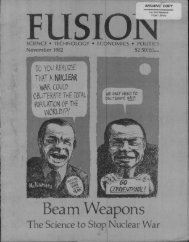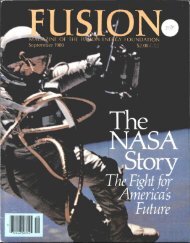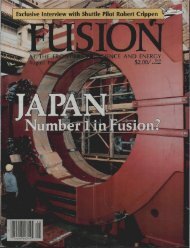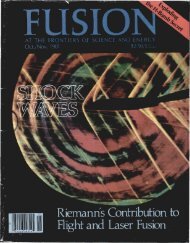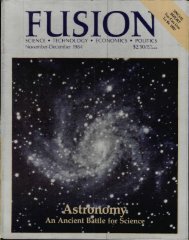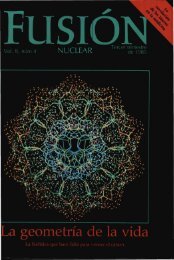science painstakingly accumulated over the previous gions tried most strenuously to liquidate when it firstone thousand years would have been inevitable. For emerged in the Judeo-Christian revolution. Suchall practical purposes, the human race would have secrets, thought the priests of Isis and the Stoics, hadceased to exist, and what scattered fragments of been dead for hundreds of years, only to reappearhumanity did manage to survive would have had to suddenly and with incredible fury in the writings ofbegin all over again the Promethan task of rediscov- Philo and in the New Testament! Embodied in theering epistemology, so-called Christian "mysteries"--the Incarnation ofActing openly when possible, in alliance with christ, the Trinity, the Redemption--was, for "thoseprinces, Roman senators, and sometimes even with that hear," the content of this secret knowledge. "Ithe emperor himself, 2 at other times acting with will open my mouth in parables," said Christ, asclandestine stealth and communicating by secret rite, recorded by the Gospel According to St. Matthew:parable, and allegory, the Christian conspiratorstr.ansformed the heritage of Platonic philosophy and "I will utter things which have been kept secretsoence into the founding principles of a universal from the foundation of the world." (Matt. 13:35)humanist empire.The explicit goal of the early Christian party was Of course, the form used by the Apostolic Churchthe establishment of what Philo Judaeus, Jesus of Fathers and their successors toconvey this knowledgeNazareth, St. Paul, and St.John called the "Kingdom was myth. The elite of the early Christian churchof God." That concept, also described as the "King- were undoubtedly aware that the superficial details ofdom of Heaven," is not, as is usually suggested, an the story of Jesus of Nazareth and the literal meaningotherworldly one. The Christian movement was very of key Church doctrines were merely part of aemphatically political, and its enemies were very technology for communicating deeper truths. Perhapsmuch in this world indeed. The enemy of the Chris- the founders of the Christian movement had notians was the unholy alliance uniting the reactionary recourse but to propound their ideas in allegoricalRoman nobility and Persian oligarchy, the Aristote- format, The material-cultural level of existing Romanlians in the Peripatetic school of pseudo-philosophy, social organization was abysmally low, and the popthedegenerate Stoic and Epicurean cults, and espe- ulation of the Mediterranean world hardly fit todally the evil priesthood of the Oriental cults con- receive undiluted science into their daily lives. Furtrollingthe hundreds of local associations dedicated thermore, the conditions prevailing at the time of theto rites of animal worship, castration, and death. Roman empire were, to say the least, not conduciveAgainst this satanic coalition--personified today, to overt political-philosophical organization. And thein direct line of succession, by the Black Guelph principles of human psychology had not yet beenmonarchists and the heirs of liberal British empiri- sufficiently elaborated to permit a more direct pedacism--theChristians sought to establish the primacy gogical approach aimed at leading dulled and backofPlatonic epistemology in order to transsubstantiate ward human minds through a complex process ofthe groveling mass ofsheeplike peasants into republi- self-understanding.can citizens of the Kingdom of God. In bringingreason to the masses, the Church confirmed itself tobe a direct threat to the Isis priesthood and the empire. BUT THE IMMORTAL ACHIEVEMENT of the earlyThe Roman oligarchs did not deceive themselves Church was that, for the first time, masses of citizensinto thinking that Christianity would lull their sub- were able to grasp the Platonic method, as promuljectswith promises of a paradise in never-never land. gated by a permanent and lasting institution, and toFor such was not the case: the political blueprint of guide their daily lives by its ethical and spiritualPhilo Judaeus, the sermons of Jesus, the revolutionary principles.writings of St. Paul, and the explosive response that The contentof the Christian religion and its "raystheGospel elicited among the inhabitants of the teries" was most centrally located in the doctrine ofRoman empire made it evident that the Kingdom of the iogos. For Philo, the logos was the "principle ofGod was, indeed, at hand. creative reason," that is, the principle by which theThe Grand Design of Christianity, to perfect the Creator-God brought order to chaos and therebystateby bringing it and its citizens into harmony with generated the seed-principles of the creation andthe Platonic ideal of reason and natural law, was development of the universe.based on a systern_bf philosophical concepts that, in Philo knew that the vast majority of the citizenssum, represented a "secret knowledge." It was this of Rome were victims of a barbarian cult ideology.secret knowledge compiled most efficiently in the Addressing himself therefore, first of all, to the urbanTimaeus of Plato which the cults and mystery reli- Hellenized Jewish community which was capable of18 August 1980 / CAMPAIGNER
esponding to his message, Philo asserted that the toward the end of his life even in direct cooperationuniverse is governed by an inherent creative principle, with the followers of Jesus of Nazareth, neverthelessor Iogos.Philo called the logos"the idea of ideas," that a particular quality of human love and vibrancy isis, the concept that allows the mind to generate other, missing from his work--the same quality that is solower-order concepts--or, Plato's "hypothesis of the warmly and powerfully present in the work of thehigher hypothesis."first Christians.Gradually, Philo created a faction of enlightened On the question of law, for instance. The Jews ofjews who seized upon the Iogosprinciple. Judea and the urban centers of the MediterraneanIn Philo's epistemological system, the logoswas an diaspora for centuries had lived under the painfullyintermediary which served as a bridge between God strict and rather cumbersome rules and regulations ofthe Creator, on one hand, and the differentiated ideas ancient Jewish tradition, compounded by the cornexistingwithin the realm of Creation, on the other, plex system of unofficial legalisms forever arguedIn fact, in several treatises Philo called the Iogos"the over by the Pharisees and Sadducees of the Temple.Son of God." It represented the instrument through Philo, in a master stroke, abolished the old system bywhich the Creator God perpetually elaborated or putting forth a new system of the "law of Moses," inperfected His Creation. It was Reason. which Philo's Moses was diabolically identified withThe bold genius of Christianity was the represen- Plato and the humanist scientists of the Alexander thetation of Jesus of Nazareth as the Iogos incarnate, Great era. Philo's new Mosaic law managed to replacepersonifying what in Philo's writing had been a rather the Ten Commandments (symbolizing the "Thouabstractphilosphical construct and thus making it shalt-not ..." mentality) with a prescriptive,immediately accessible to a large population of quite positive law.uneducated people. Consciously making use of the By introducing the logosin this context, Philo laidfact that Philo's work had won acclaim among the the basis for the modern concept of a republicaninner elite of Jewish intellectuals, Jesus represented constitution embodying the coherence of naturallaw,himself as the <strong>Logos</strong>, the Son of God. Always subor- as defined by the Neoplatonists, and constitutionaldinated to "the Father," Jesus nevertheless called law. Jesus of Nazareth, by forcing the issuewusinghimself the instrument through which God brought such means as, for instance, breaking up the immoralabout Creation. Or, as St. John writes, the <strong>Logos</strong> activities in the Jerusalem Temple--then completed"was in the beginning with God," and "all things what Philo only began, explicitly, rather than merelywere made by him, and without him was made implicitly, replacing the Ten Commandments andthenothing that was made. law of Moses with "the New Dispensation," the lawBy urging that men and women follow Jesus and of love.so "become sons of God," the early Christians com- The idea of the Kingdom of God, in which themunicated to the Jew and pagan alike that each social-political order is determined according to Reacontainedwithin himself the power to bring forth son, provided in subsequent centuries the model fortheir own "divinity," and live a life governed by the City of God of St. Augustine, written in the earlyReason. Thus, for the Christians Jesus embodied a fifth century, and for the umma ("community") estabconcreteuniversal: self-conscious, self-expanding lished in the seventh century by the Prophet Mo-Reason. hammed's Constitution of Medina. The humanistOn a simpler level, the utter, uncompromising Carolingian and Abbasid empires emerged, respecmoralityof Jesus of Nazareth, even more striking tively, in Europe and the Middle East on the founamidthe moral squalor of ancient Rome, caused Jesus dation of these principles. Christian and Muslimto become a model for ethical behavior. Quite liter- humanists of succeeding centuries derived their inspirally,he was the living conscience of an entire empire, ation from the common heritage of Near EasternThe fact that Jesus of Nazareth established the Neoplatonism, especially as represented in the tramovementthat came to be called Christianity points ditions of the Judaism of Rabbi Philo, Apostolicup a significant idea concerning the relationship Christianity, and Islam. The overarching Islamic IsbetweenJesus and Philo. Whereas Philo was content maili tradition that took root at the caliphal court into present his enormously powerful ideas objectively Baghdad and later spread into Egypt, North Africa,in the form of essays and coded writing, Jesus was and southern Europe carried the principle of the Iogoscompelled to organize a mass movement on the basis further.of those ideas. Nothing underlines this idea more than It is in this sense that the early Christians laid thethe fact that it was Jesus, and not Philo, who was basis for Neoplatonic humanism and political repubcrucifiedby the authorities. Although Philo fought licanism in every succeeding generation.courageously against the cult enemy that ruled Rome, The Neoplatonic content of the Judeo-ChristianCAMPAIGNER / August 1980 19
- Page 8 and 9: Behind theMiami Riotsby Felice Merr
- Page 11 and 12: 1. Policy-making: the Trila- their
- Page 13 and 14: _•_• •_• convention, was al
- Page 15 and 16: FEMA's vision of thefuture: a racia
- Page 17 and 18: Janet Reno completely bungled and f
- Page 19: IntroductionFor we wrestle not agai
- Page 23 and 24: The enemy of the Christians was ind
- Page 25 and 26: ing of Rome itself, lasted hundreds
- Page 27 and 28: notions about the gods and views on
- Page 29 and 30: people who live in cities do not kn
- Page 31 and 32: prevailing bestiality would have to
- Page 33 and 34: Mediterranean elite, and in the pop
- Page 35 and 36: self-denial and a disassociation of
- Page 37 and 38: wearily strive, but from which they
- Page 39 and 40: itself as many sensible classes of
- Page 41 and 42: altered or forged. The existence an
- Page 43 and 44: Certainly,Jesus entered Jewish soci
- Page 45 and 46: commitment to that ideal against we
- Page 47 and 48: Christ Presented to the People by P
- Page 49 and 50: cast into his garden, and it grew a
- Page 51 and 52: uilt the Christian movement was a b
- Page 53 and 54: pagan cults to bore inside the move
- Page 55 and 56: despite their inhuman behavior--whi
- Page 57 and 58: early gnostic text, Thunder, Perfec
- Page 59 and 60: And said, "O full of all subtlety a
- Page 61 and 62: • Rome• M A C ED O N IA "_i_::i
- Page 63 and 64: the level spaces. Then it climbed t
- Page 65 and 66: latter half of the second century,
- Page 67 and 68: great many people could be reformed
- Page 69 and 70: And upon her forehead was a name wr
- Page 71 and 72:
60 A.D. PAUL's Roman imprisonmenL a
- Page 73 and 74:
The drugplagueis onlypartof tile st
- Page 75 and 76:
severalanti-Falk letters, not just
- Page 77 and 78:
BOOKSWhy the Green Nigger,Re-mythin
- Page 79 and 80:
pathy, clairvoyanCe,*:;_'_%cogni- d
- Page 81 and 82:
netarist school of economics beat a
- Page 83 and 84:
illegal seizure of property rights)
- Page 85 and 86:
of Cardinal Nicholas of Cusa as obl
- Page 87 and 88:
I.mERSiThis criticism of Carter is
- Page 89 and 90:
several years in England as the yea



